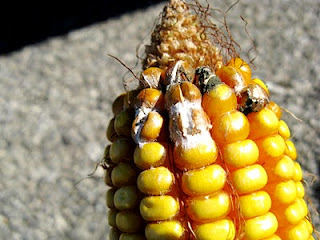Saturday, July 27, 2013
WHAT YOU SHOULD KNOW ABOUT MOLD TOXINS
Everyone knows what mold is, and we have all seen moldy food. But very few people know much about mold toxins. So just how dangerous are they?
In my opinion, mold toxins such as aflatoxin are a much more serious threat than we realize. And not just to people who are allergic to mold. To all of us, wherever we live and whatever diet we are on.
Aflatoxin, and especially aflatoxin B1 is a very carcinogenic (Level 1) mold toxin. It is, in fact, the most potent microbial carcinogen we know of. Aflatoxin is produced by the Apergillus family of fungi, particularly Aspergillus flavus and Apergillus parasiticus - very ordinary kinds of mold. But before you get too nervous, let me stress that not every mold you see on your food is one of these, and even if it is, these molds only produce toxins some of the time.
The molds, and the toxin, is most likely to be found in foods such as grains (especially maize, millet and sorghum), peanuts, seeds, and legumes. It is everywhere in the soil and air and can enter the plants in the field or even post-harvest, especially when such foods are badly stored in warm and moist conditions. But, the toxin can also be present in meat, poultry, eggs and dairy, because of contaminated animal feed. And it has turned up at high levels in dog food as well (including in the United States).
Globally, the people at biggest risk for aflatoxin and aflatoxicosis, are the poor of developing nations - especially in Sub-Saharan Africa, South-East Asia, and the Western Pacific (which includes countries such as China), who live on a diet which relies heavily on food such as maize and peanuts. People in these countries suffer various health problems as a result: acute and chronic aflatoxicosis, liver cancer, liver cirrhosis, and nutrition-related problems in children.
Those of us living in other parts of the world, even in countries where governments have strict standards for how much of this toxin is allowed in food, are likely to only be getting low levels of the toxin. But the chances are that we do get some every single day. Unfortunately, studies have shown that even relatively small amounts of the toxin, over a period of time can weaken your immune system. In turn, this has been found to compound other health problems you may have ( as well as make you more susceptible to all kinds of illnesses, including food poisoning). For instance, researchers have now found that high levels of aflatoxin in your body can increase the harm that H.I.V. and hepatitis B virus do to your body.
So what can we do at a personal level? First, we should check products such as peanuts, grains, coffee beans and corn yourself for presence of mold before you eat them, and, of course they should be carefully stored in the home. It is also important to take care when you are buying food. I have found corn sold in very reputable stores to have Aspergillus mold (and I know what it looks like). And - yes, I hate to say this, and I know some of you will hate me for it - but you need to be especially careful with any "Free Trade" products coming in from Sub-Saharan Africa. Sometimes packages are not properly sealed, which could lead to mold contamination. Believe me, I have seen it. And, you should check your peanuts before eating and not eat any that have broken shells.
I have actually given quite a lot of attention to mold toxins in The Safe Food Handbook (the book, not the blog). Why? Because I like to be ahead of the issues, not behind.
To your good health,
TSF
Subscribe to:
Post Comments (Atom)




No comments:
Post a Comment